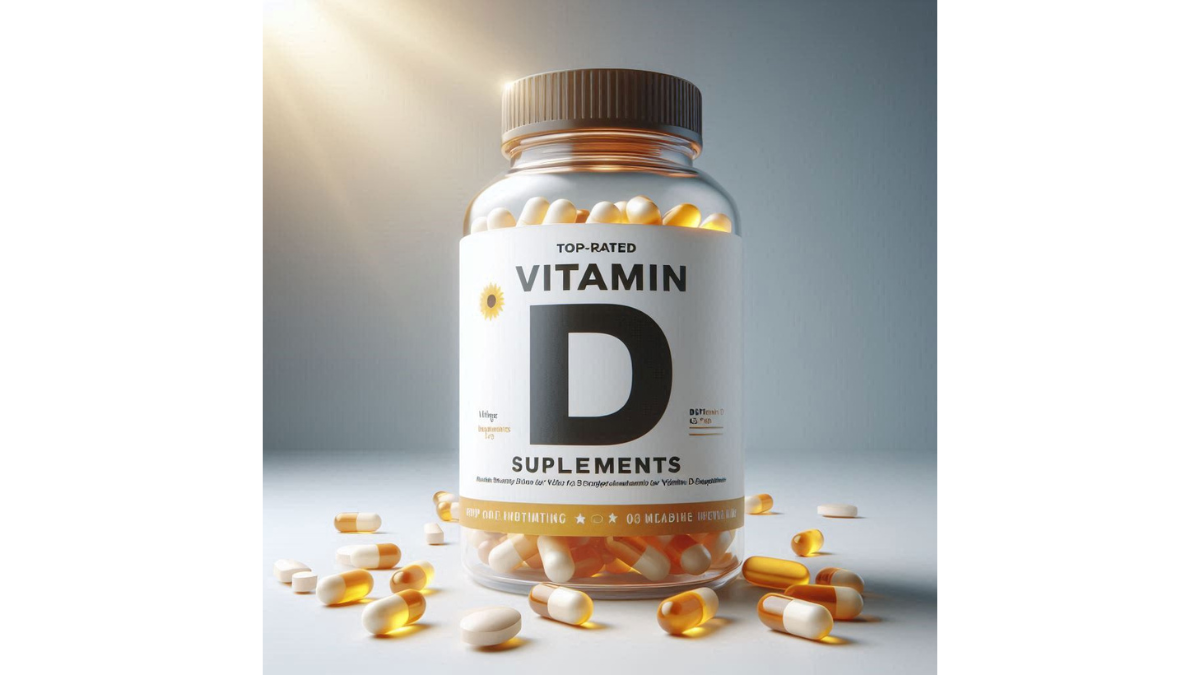Top-Rated Vitamin D Supplements Reviewed and Recommended

Top-Rated Vitamin D Supplements Reviewed and Recommended -Vitamin D often goes under the radar when discussing essential nutrients, but its significance is profound. Think of it as the “sunshine vitamin,” primarily because your body produces it in response to sunlight. However, not everyone gets enough sun exposure, especially during the colder months or in certain geographic locations. The importance of vitamin D cannot be overstated. It plays a crucial role in maintaining bone health by facilitating calcium absorption in the gut, ultimately supporting strong and flexible bones. For example, when I moved to a city where the winters are long and dreary, I began to experience aches and pains that puzzled me. After speaking with my healthcare provider, I learned that my vitamin D levels were low due to limited sun exposure.
Once I started supplementing, I noticed a significant improvement in my energy levels and overall well-being—highlighting just how pivotal this vitamin can be. Additionally, research suggests that vitamin D might enhance your immune system. This means adequate levels could potentially lower the risk of infections and chronic diseases, including type 2 diabetes and cardiovascular issues. In a world where staying healthy is a priority, understanding the role of vitamin D can help you make informed choices about your health regimes.
Factors to Consider When Choosing a Vitamin D Supplement
With the plethora of supplements available on the market, deciding on the right vitamin D supplement can be overwhelming. Here are some key factors to consider that can simplify your decision:
- Type of Vitamin D:
- Vitamin D comes in two forms: D2 (ergocalciferol) and D3 (cholecalciferol). D3 is the preferred choice as it is more effective at raising and maintaining vitamin D levels in the blood. Always check the label to ensure you’re getting vitamin D3 for optimal benefits.
- Dosage:
- The right dosage varies depending on your age, health status, and specific needs. The standard recommendation for adults is between 600 to 800 IU daily, but some people may require higher doses. It’s best to consult with a healthcare professional to assess your specific needs.
- Additional Ingredients:
- Some vitamin D supplements are combined with other nutrients like calcium or magnesium for added health benefits. If you’re looking for a comprehensive bone health solution, consider these as viable options.
- Quality and Purity:
- Opt for supplements that have been third-party tested for quality. You’ll want to avoid those that contain fillers, artificial colors, or allergens. Brands that are transparent about their sourcing and manufacturing processes can usually be trusted more.
- Form of Supplement:
- Vitamin D supplements come in various forms, including capsules, gummies, and liquid drops. If you have difficulty swallowing pills, gummies or liquid forms may be more suitable. Just note that gummies may contain added sugars, so check the nutritional facts.
- Personal Preferences:
- Consider your lifestyle and preferences. If you have dietary restrictions (like a vegan diet), look for vegan-friendly options. There are several brands on the market that specialize in ensuring their products are suitable for various dietary needs.
- Absorption Factors:
- Look for vitamin D supplements that are packaged with healthy fats, as the vitamin is fat-soluble and often absorbed better when taken with a meal that contains fat.
By keeping these factors in mind, you can better navigate through the options available until you find the right supplement tailored to your body’s needs. The journey to better health starts with informed choices, and understanding the importance and type of vitamin D supplements is a crucial first step. This knowledge not only empowers you to make smarter decisions but also sets the stage for maximizing the benefits of vitamin D in your daily routine. As we dive deeper into the benefits of vitamin D, you will see just how transformative this nutrient can be.
Benefits of Vitamin D
Supporting Bone Health
As we delve deeper into the benefits of vitamin D, its role in supporting bone health stands out prominently. Imagine your bones as a sturdy house; they need a solid foundation to stand tall against the elements. When you have adequate levels of vitamin D, your body can effectively absorb calcium from the food you eat, which is crucial for maintaining healthy bone density. In my own life, I noticed a significant difference when I paid attention to my vitamin D intake. Several years ago, I started experiencing joint discomfort after prolonged sitting, which was puzzling.
After some research and consultations with my doctor, I learned that low vitamin D levels could lead to weakened bones, making them more susceptible to pain and fracture. Once I made sure to include vitamin D-rich foods and supplements in my routine, I noticed a remarkable improvement not just in my joint pain but also in my overall activity levels. Here’s how vitamin D supports bone health:
- Calcium Absorption: Vitamin D enhances your gut’s ability to absorb calcium, a fundamental building block for strong bones. Without enough vitamin D, your body cannot effectively utilize calcium, leading to potential deficiencies.
- Bone Remodeling: Vitamin D plays a role in bone remodeling—an ongoing process where old bone tissue is replaced by new bone tissue. This process is vital for maintaining bone strength and preventing osteoporosis, a condition characterized by brittle and fragile bones.
- Prevention of Osteoporosis: Adequate vitamin D levels are particularly important in older adults. Research indicates that maintaining sufficient vitamin D levels can reduce the risk of osteoporosis and related fractures, particularly hip fractures, which can significantly impact quality of life.
As you can see, the circle of health influenced by vitamin D and calcium goes hand in hand, forming a strong foundation for physical activity and an active lifestyle.
Boosting Immune System
Moving on to another compelling benefit, vitamin D has been increasingly recognized for its role in boosting the immune system. In today’s health climate, where many of us are focused on maintaining our well-being, a robust immune system is more important than ever. Vitamin D is not only a bone-supporting nutrient but also a modulator of immune function. The body contains receptors for vitamin D on immune cells, indicating that it plays a role in the immune response. Here are several ways vitamin D contributes to immune health:
- Enhancing Pathogen Defense: Studies have shown that adequate vitamin D levels can enhance the pathogen-fighting effects of monocytes and macrophages—white blood cells crucial for our immune response. Thus, a well-functioning immune system helps combat infections more effectively.
- Reducing Inflammation: Vitamin D plays a role in regulating inflammation within the body. Chronic inflammation can lead to numerous health issues, including autoimmune diseases. By helping to keep inflammation in check, vitamin D can promote better overall immune function.
- Potential Role in Respiratory Health: There is emerging evidence that healthy vitamin D levels might reduce the risk of respiratory infections. Many people reported feeling better during the flu season after ensuring they had sufficient vitamin D in their system.
When I started paying attention to my vitamin D levels, not only did my joints feel better, but I also noticed that I managed to avoid the seasonal colds and flu that used to lay me low every winter. Although it’s not a substitute for all preventive measures, adequate vitamin D supplementation can certainly give your immune system a fighting chance. In summary, vitamin D is indispensable for a holistic approach to health—supporting not only bone strength but also enhancing immune functionality. It is a powerhouse vitamin that can significantly impact your quality of life. So ensure you’re making this essential vitamin a priority in your health regimen, and you may just experience the transformative benefits firsthand! As we continue through this guide, let’s explore the top-rated vitamin D supplements that can help you achieve those optimal levels.
Top-Rated Vitamin D Supplements
Criteria for Selection
Now that you understand the vital benefits of vitamin D, it’s time to explore the top-rated supplements available. Choosing the right vitamin D supplement ensures you reap all its health benefits while avoiding any unwanted side effects. I remember feeling overwhelmed by the options I encountered when I decided to boost my vitamin D levels. After doing some research, I identified key criteria that helped streamline my decision-making. Here’s what you should consider when selecting a vitamin D supplement:
- Form of Vitamin D:
- As we discussed earlier, vitamin D3 (cholecalciferol) is generally preferred over D2 (ergocalciferol) for its superior efficacy in raising blood levels of vitamin D.
- Dosage:
- It’s essential to choose a supplement that aligns with your needs. Look for a product that offers a variety of dosages; this will allow you to start at a level that suits you and gradually adjust as necessary.
- Ingredient Transparency:
- Select brands that provide clear labeling about their ingredients. Transparency is key for ensuring that no harmful fillers or allergens are included.
- Third-Party Testing:
- Supplements that have undergone independent testing can give you peace of mind regarding their purity and potency. Look for seals of approval from reputable third-party organizations.
- Bioavailability:
- Consider supplements that include healthy fats, as vitamin D is fat-soluble. This can enhance absorption and efficacy, helping you achieve the desired results faster.
- Dietary Considerations:
- For those who follow specific dietary restrictions, seek out vegan or vegetarian-friendly options. Certain supplements use animal-derived ingredients, so it’s important to read labels carefully.
- Customer Reviews:
- Looking at real-life testimonials can provide valuable insight. Check for reviews from users who have achieved similar health goals to yours.
When I narrowed my choices based on these criteria, it became much easier to identify the brands that stood out and offered high-quality supplements. With this foundation laid, let’s transition to a review of some of the top-rated vitamin D supplements on the market.
Review of the Top Picks
Now, let’s dive into a review of some of the most highly recommended vitamin D supplements based on the criteria we’ve discussed. I’ve compiled this list from various reputable sources and personal experiences:
- Thorne Research Vitamin D3:
- Dosage: Available in 1000 IU and 5000 IU forms.
- Highlights: Thorne Research is heavily praised for its commitment to quality and purity. This supplement is gluten-free, dairy-free, and contains no artificial ingredients.
- Customer Feedback: Users often note improvements in energy levels and mood within a few weeks.
- Nature Made Vitamin D3:
- Dosage: Available in both 1000 IU and 5000 IU doses.
- Highlights: Nature Made is USP verified and known for affordable pricing without compromising on quality.
- Customer Feedback: Many users appreciate the easy-to-swallow softgel form.
- Garden of Life Vitamin D3:
- Dosage: 2000 IU per serving.
- Highlights: This option is vegan, made from whole foods, and contains no synthetic ingredients. It also includes a blend of probiotics for digestive support.
- Customer Feedback: Consumers love the delicious orange flavor and report better bone health.
- NOW Foods Vitamin D3:
- Dosage: Available in 1000 IU and 5000 IU sizes.
- Highlights: NOW Foods offers a budget-friendly vitamin D3 option without sacrificing quality. They provide transparency with detailed labeling and third-party testing.
- Customer Feedback: Positive reviews highlight its effectiveness and overall value.
- Solgar Vitamin D3:
- Dosage: Available in 1000 IU and 2000 IU.
- Highlights: Solgar is known for its premium-quality supplements and uses the most bioavailable form of vitamin D. The capsules are also free of gluten, wheat, and dairy.
- Customer Feedback: Many appreciate the balanced formulation and report noticeable mood improvements.
Each of these supplements meets or exceeds the criteria outlined earlier, making them reliable options for boosting your vitamin D levels. As always, consult with a healthcare provider before starting a new supplement, ensuring it’s tailored to your individual health needs. In summary, with the right supplement, you can effectively enhance your overall well-being while enjoying the numerous benefits that vitamin D has to offer. As we continue this journey towards better health, let’s discuss how to incorporate vitamin D into your daily routine effortlessly.
How to Incorporate Vitamin D into Your Routine
With a list of top-rated vitamin D supplements in hand, the next step is to seamlessly incorporate vitamin D into your daily routine. It’s essential to understand not just how much to take but also when to take it for maximum benefits. I vividly recall starting my vitamin D journey and feeling overwhelmed by all the details. Over time, I found routines that worked effectively for me. Let’s explore how you can do the same!
Daily Dosage Recommendations
Get ready to level up your vitamin D intake by figuring out the right daily dosage for your needs. The recommended daily allowance (RDA) varies by age, health conditions, and lifestyle factors. Here’s a general breakdown:
- Infants (0-12 months): 400 IU (10 mcg)
- Children (1-18 years): 600 IU (15 mcg)
- Adults (19-70 years): 600 IU (15 mcg)
- Adults (71 years and older): 800 IU (20 mcg)
- Pregnant and breastfeeding women: 600 IU (15 mcg)
It’s crucial to know that these are general recommendations. Special conditions like obesity, malabsorption syndromes, or certain health issues may require higher doses. When I started taking vitamin D, there was a mix of science-backed recommendations and adjustments based on my functional needs. After a conversation with my healthcare provider and a blood test, I discovered that a higher dose was appropriate for me. Considerations for Daily Dosage:
- Lifestyle Factors: If you are someone who lives in colder climates with limited sunlight exposure or have a predominantly indoor lifestyle, it’s wise to consider a higher dosage after consulting your doctor.
- Blood Testing: Periodic blood tests can help monitor your vitamin D levels, allowing for tailored adjustments.
- Supplement Forms: Different supplements provide varying potencies. Be mindful of your specific product’s dosage per serving.
Keeping track of your vitamin D intake can assure that you’re catering to your body’s unique needs and maximizing the effectiveness of your supplementation.
Best Time to Take Vitamin D Supplements
Now, let’s talk about the timing—when should you take your vitamin D supplement for optimal absorption? Here are a few practical tips derived from my own experience:
- Take with a Meal:
- Since vitamin D is fat-soluble, taking your supplement with a meal that contains healthy fats can significantly enhance absorption. Think about pairing it with foods like avocados, nuts, or olive oil. I usually take my vitamin D with lunch, which often includes some olive oil dressing!
- Morning or Evening:
- The best time to take vitamin D can vary among individuals. Some prefer taking it in the morning to align it with their natural circadian rhythm, while others may take it in the evening. I found that taking it in the morning worked best for me since it set a positive tone for the day. However, if you notice that it affects your sleep, consider switching to the evening.
- Consistency is Key:
- Whatever time you choose, ensure you are consistent. Consider adding it to your daily routine, like alongside your morning coffee or an evening snack. Setting reminders on your phone can also be beneficial until it becomes a habit.
- Monitor Your Response:
- Pay attention to how your body responds to different timings. If you feel unusually energetic or alert after taking it at one time versus another, adjust accordingly. That’s how I found my perfect routine!
- Avoid Taking with Certain Medications:
- Some drugs and supplements may interfere with vitamin D absorption. For example, extremely high doses of antacids can lower stomach acidity, affecting nutrient absorption. Always consult your healthcare provider if you’re on other medications to clarify the best timing.
By understanding the recommended dosages and determining the ideal timing, you can effectively integrate vitamin D into your daily life, maximizing its benefits. In summary, making vitamin D part of your routine doesn’t have to be complicated. With thoughtful adjustments and attentiveness to your body’s needs, you can ensure that you’re on the road to better health. Next, we’ll address an essential aspect of vitamin D supplementation: the risks and potential side effects of overdose, as being informed is the best way to stay healthy and safe.
Risks and Side Effects of Vitamin D Overdose
As we continue our journey to understanding vitamin D, it is essential to discuss a critical aspect— the potential risks and side effects associated with vitamin D overdose. While vitamin D is undoubtedly beneficial for your health, it’s crucial to recognize that more is not always better. When I first began supplementing, I was excited to unlock the benefits of vitamin D but quickly learned that exceeding the recommended dosage without proper guidance can lead to unwanted side effects. Let’s look into the symptoms of vitamin D toxicity and how to ensure you stay on the safe side.
Symptoms of Vitamin D Toxicity
Vitamin D toxicity is primarily caused by taking extremely high doses through supplements and is rare with food sources or sun exposure. Nevertheless, it’s essential to be aware of the signs of overdose:
- Hypercalcemia: One of the most concerning aspects of vitamin D toxicity is elevated calcium levels in the blood, known as hypercalcemia. Symptoms can include:
- Nausea and vomiting
- Weakness and fatigue
- Increased thirst and frequent urination
- Confusion and disorientation
- Kidney Issues: High vitamin D levels can lead to kidney stones or even kidney damage due to excessive calcium deposits. You might notice:
- Pain in the back or side
- Blood in urine
- Cloudy or foul-smelling urine
- Gastrointestinal Problems: An overload of vitamin D can upset the digestive system, leading to:
- Loss of appetite
- Abdominal pain
- Constipation or diarrhea
- Cardiovascular Effects: Although rare, excessive vitamin D may impact heart health and blood pressure. Signs might include:
- Irregular heartbeats
- Increased blood pressure
Recognizing these symptoms early can make all the difference. If you suspect that you’ve taken too much vitamin D, it’s important to consult a healthcare provider for an assessment.
Precautions to Avoid Overdosing
Avoiding vitamin D overdose is much easier when you incorporate simple precautions into your daily routine. Here’s what I’ve learned, backed by experiences and advice from healthcare professionals:
- Stick to Recommended Dosages:
- Always adhere to the recommended daily allowances as discussed earlier. Even if you’re feeling great, it’s wise not to exceed 4000 IU/day unless advised by a doctor.
- Consult With Healthcare Providers:
- Before beginning any new supplementation, have an honest conversation with your healthcare provider. A simple blood test can determine your current vitamin D levels and guide you in obtaining the right dosage to target your needs without overdoing it.
- Be Cautious with Multivitamins:
- Multivitamins can contain varying amounts of vitamin D. When combined with separate vitamin D supplements, it can be easy to lose track of total intake. Always check labels and add up the total vitamin D content you’re consuming.
- Monitor Symptoms:
- Keep an eye on how you feel after starting supplementation. Any undesirable symptoms like fatigue, nausea, or changes in your urination patterns should prompt a reassessment of your intake.
- Consider Seasonal Needs:
- If you live in a location where summer sunlight is plentiful, you might get enough vitamin D naturally during that time. Use these periods to adjust your supplementation accordingly. I personally take less in the summer, relying on sunlight, and increase during the winter months.
- Stay Informed:
- As research into vitamin D continues to evolve, staying updated on studies can provide you with insights into safe practices. Resources like healthcare articles, trusted medical journals, and official dietary guidelines can be invaluable.
In conclusion, while vitamin D is critical for your health, it is equally important to stay informed and cautious to avoid potential overdose. By following these practical precautions, you can enjoy the benefits of vitamin D while ensuring your safety. Just remember, moderation is key! As we wrap up this informative journey on vitamin D, let’s tackle some frequently asked questions surrounding vitamin D supplements, clarifying any lingering doubts or misconceptions you may have. Your health journey shouldn’t be confusing, but rather empowering and insightful!
Frequently Asked Questions About Vitamin D Supplements
As we conclude our comprehensive discussion on vitamin D, it’s only fitting to address some frequently asked questions that many people have regarding vitamin D supplements. People are often curious, and I was no exception when I started this journey. Let’s get right to it!
Can You Get Enough Vitamin D from Sunlight?
The short answer is yes, you can get sufficient vitamin D from sunlight, but there are several factors to consider. I remember when I first discovered this fact, I felt a wave of relief washing over me. The idea of soaking up some rays to boost my vitamin D levels sounded much more pleasant than taking a daily supplement! Here’s a breakdown of how sunlight impacts vitamin D levels:
- UVB Rays: When your skin is exposed to sunlight, specifically UVB rays, your body synthesizes vitamin D. Just 10 to 30 minutes of midday sun exposure several times a week can be adequate for most people, depending on skin type and geographic location.
- Skin Type and Age: Your skin color significantly influences how much vitamin D you produce. Lighter skin synthesizes vitamin D more efficiently than darker skin. Additionally, as you age, your skin becomes less effective at producing vitamin D.
- Geographic Location and Season: Living closer to the equator means more consistent exposure to the sun year-round. In contrast, people in northern latitudes may find it challenging to get enough sun during the winter months.
- Sunscreen Use: While essential for protecting your skin from UV damage, sunscreen can also reduce vitamin D production since it blocks UV rays. Thus, striking a balance is crucial—spending some time in the sun without sunscreen can be beneficial for vitamin D levels but is best limited to safe durations.
While sunlight can indeed provide vitamin D, there are countless variables in our lives, like longer working hours indoors and lifestyle choices, that can impede our ability to get enough from the sun alone. Thus, in certain circumstances, supplementation might be necessary.
Are There Any Interactions Between Vitamin D and Other Supplements?
When I began my vitamin D journey, I had various other vitamins and supplements in my routine. Naturally, I was curious about any potential interactions that might occur. After researching and consulting with my healthcare provider, I came away with some helpful insights.
- Calcium: Vitamin D and calcium work hand-in-hand for optimal bone health. If you’re taking calcium supplements, pairing them with vitamin D can enhance calcium absorption. I personally started taking both together in the morning to maximize their benefits.
- Magnesium: This mineral is crucial for converting vitamin D into its active form in the body. If your magnesium levels are low, it can potentially reduce the effectiveness of vitamin D supplementation. If you’re looking to optimize your vitamin D levels, it may be worth considering magnesium-rich foods or supplements.
- Iron Supplements: There is no direct conflict between vitamin D and iron, but it’s important to note that high doses of iron can sometimes interfere with the absorption of other minerals. Therefore, they should be taken at different times of the day.
- Fat-Soluble Vitamins: Vitamins A, E, and K are fat-soluble like vitamin D. Taking them together can enhance absorption and overall nutrient synergy within your body. If you’re taking a multivitamin, ensure it provides a balance of these nutrients.
- Medication Interactions: Certain medications—such as corticosteroids, weight-loss drugs, and specific anticonvulsants—can affect vitamin D metabolism. Always talk to your healthcare provider before combining vitamin D supplements with other medications you’re taking.
With all of these interactions in mind, maintaining an awareness of how various supplements can influence each other is crucial. It’s always a good idea to talk with a healthcare professional, especially if you’re considering adding multiple supplements into your routine. In conclusion, understanding how sunlight and other supplements impact vitamin D levels helps you make informed decisions about your health. By being proactive and educated, you can take control of your vitamin D journey and enhance your overall wellness. Thank you for joining me on this enlightening adventure through vitamin D—may you flourish in health and vitality!
You might also find this article helpful Bone Health: Building Strong Bones






3 Comments